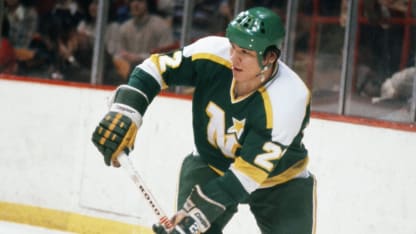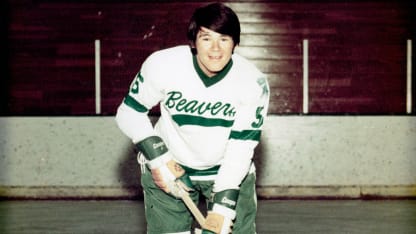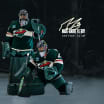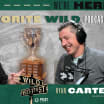Those who played with Gary Sargent don't remember him as a flashy player, even at the pinnacle of his hockey career, yet he was solid and dominant. And according to those same accounts, the stout defenseman they called "Sarge" carried leadership qualities shown in his work ethic on the ice and a locker room presence that wasn't too loud or boisterous.
"He was never one of those guys that was 'Rah! Rah! Rah!', but he was a dominant player," said former Minnesota North Stars teammate Jack Carlson.
Sargent was raised in Bemidji and worked his way up through amateur hockey and into the pros as a draft pick of the Los Angeles Kings before he returned to his home state to play for the North Stars. He was selected to play in the 1980 NHL All-Star game, but that's when his hockey-playing days began to wither. A lingering back injury held him out of All-Star activities in 1980 and 1981, which preceded three seasons of limited playing time. Just as his back problems began to subside, a knee-to-knee hit in a playoff game against Montreal knocked him out for good in 1983.
Full circle: Sargent enjoys retirement where it all began
Former North Star, Beaver grew up on Bemidji hockey

Just like that, it was time for "Sarge" to hang up his skates.
"When you're in so much pain, you need help putting socks on in the morning to go play hockey, that's miserable," Sargent said. "I said that when hockey became a job, I'd hang it up."
His story seems like it might have a sad ending, but Sargent's sense of humor allows him to chuckle and throw in a couple of wisecracks while talking about his shortened NHL career.
Hockey Day Minnesota 2019
Sargent and his wife of almost 43 years, Jay, moved back to their hometown of Bemidji -- the site of this year's
Hockey Day Minnesota
-- in the mid-80. Today, you can still find Sargent on the ice, only he's in an ice house.
"I fish a lot of the lakes around here," Sargent said, "We live on Lake Marquette south of town, and it has good fishing, too, so I'm out there quite a bit.
"We'd come back up here (to Bemidji) every offseason when I was playing. It's not a small town, but it has that small-town atmosphere."
Sargent still follows the hockey teams he once played for, the Bemidji High School Lumberjacks and the Bemidji State Beavers, who'll both play on Hockey Day next Saturday on the shores of Lake Bemidji.
Hockey in Bemidji was a far cry from where it is today, according to Sargent, and was largely in its infancy when he and his family arrived in town in the early 60s.
Sargent was born in 1954 in Red Lake and started skating during first grade in Warroad.
"They were just starting up the hockey program in Bemidji when we got there," Sargent said. "We were the first class to go to state in peewees in 1966."
He was a star for Bemidji High School and led the Lumberjacks to their first appearance in the Minnesota high school state tournament in 1972. Bemidji lost twice, but the most pain Sargent felt was on the bus ride home.
"My appendix broke, and I got pretty sick on the way home," Sargent said. "My stomach was hurting, but I thought I just had the butterflies. I played through it.
"We didn't do too well, but we showed up. It was a big building, but the ice rink is the same size; it just holds more people. We were nervous at first, but it works itself out."
Not long after Bemidji's state appearance, the pro sports organization in Metropolitan Stadium across the parking lot from the Met tried to sign Sargent, a multi-sport star, to a professional contract.
"The Minnesota Twins offered me a contract, but I turned them down," said Sargent, who said he was also offered college football scholarships by most of the Big Ten schools.

© Bemidji State Athletics
Sargent's future teammate Carlson never played him in high school hockey, but they did meet on the baseball diamond.
"I remember thinking Gary was a better baseball player than a hockey player," said Carlson, who played high school sports for Virginia. "Man, could that guy hit a ball hard, and he could throw it hard, too."
But Sargent stuck with hockey and recorded 23 goals and 24 assists in 47 games as a freshman in his only season at Bemidji State, leading the Beavers to their fifth National Association of Intercollegiate Athletics championship in six seasons.
He played for the Fargo-Moorhead Sugar Kings of the North American Hockey League the following season and was selected to play on the United States national junior team. Sargent signed his first NHL contract with the Los Angeles Kings after they drafted him 48th overall.
L.A. living was a little faster-paced than Bemidji, but as Sargent warmed up to the West Coast lifestyle, the West Coast warmed up to a new sport.
"It was a big city, man, but you could get used to that warm weather," Sargent said. "There were a lot of Canadians that lived in L.A., so we had good crowds, but anywhere you go, people want to watch a winner."
The Kings made the Stanley Cup Playoffs in 197,7 and after a season in which Sargent was fifth on the team in scoring (54 points) and third in assists (40), he went to the team's front office to lay the groundwork for a new contract that would extend his stay in Los Angeles.
"I went to the general manager and told him I'd like to sign another contract with the Kings," Sargent said. "I told him I wanted to be able to purchase a house, and he said, 'Well, make sure you have wheels underneath it'. That was his attitude."
The Kings didn't want Sargent, but the North Stars did and, so, his hockey career continued in the same arena where his high school career ended.
Sargent was also one of at least seven Minnesotans to play for the North Stars in each of his first four seasons with the team and that was important to coach Glen Sonmor, who coached the Gophers and Fighting Saints before he took over the North Stars.
"He liked coaching Minnesota kids because he knew what he was going to get," Carlson said. "He knew players had heart, and he knew Minnesota players were going to give it their all."
Want more Wild headlines? [Sign up for e-News]
Unfortunately, Sargent began to feel a lingering pain in his back with shooting pains down his legs -- not to mention his migraine headaches and back spasms -- during the 1979-80 season, which forced him to miss the remaining 30 games plus the '80 and '81 All-Star Games.
He played 56 games over his final three seasons because of injury and the knee-on-knee collision in 1983 was the final straw. Sargent finished his 187-game run in a North Stars jersey with 32 goals and 71 assists.
"It was so unfortunate that he ended up with that bad back," said Craig Hartsburg, a six-year captain for the North Stars who was often paired with Sargent on the blue line as a rookie. "He would've been such an important player for us in those early runs in the playoffs. He was a big asset for us. He was very mobile, strong as an ox, he could shoot, he could defend."
Sargent isn't overly optimistic he'll be able to take in the Hockey Day Minnesota events in person because of the limited seating, and the after-effects of his injuries make it difficult to stand for long periods of time. He has a knee replacement scheduled for February and said he doesn't have any cartilage left and the ligaments are all torn.
"I guess I played too much hockey," Sargent said with a chuckle.

Related:
- For Serratore brothers, every day is Hockey Day
- Hockey Day 2019: By the numbers


















